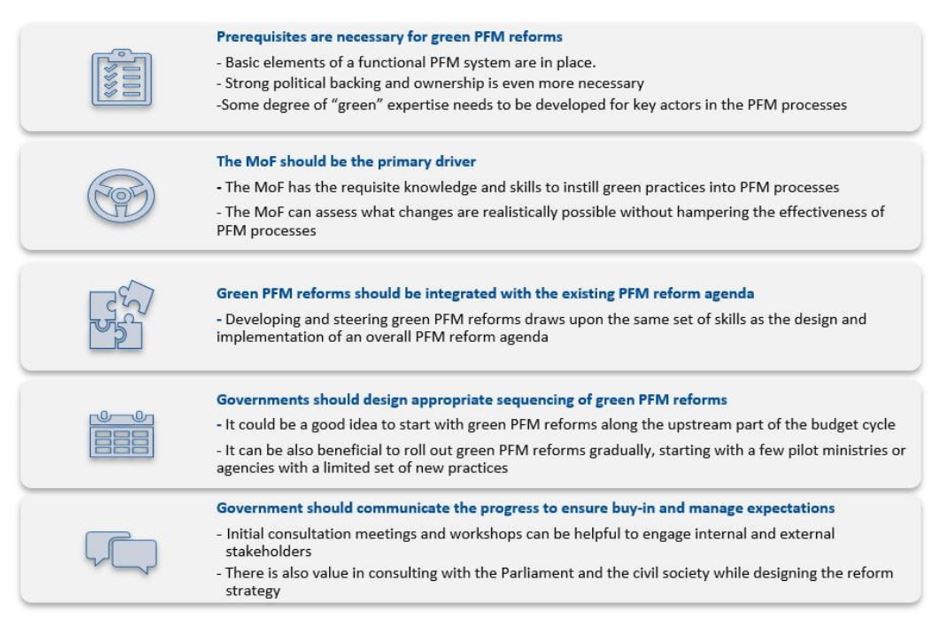
The momentum for implementing green budgeting has been growing worldwide, and the results have been encouraging, with greater awareness and increased expenditure contributing to achieve climate objectives. There is still much to do, but understanding the concepts, recognizing the strategic drivers or opportunities for introducing green budgeting, and learning about ways to cope with the implementation challenges are the building blocks of an ambitious reform.
From July 11 to 14, 2023, an IMF team brought together officials from Ministries of Finance of Albania, Bosnia and Herzegovina, Kosovo, Montenegro, and North Macedonia, to discuss key Green Public Financial Management (Green PFM) principles. Guidance was provided on developing climate budget tagging and identifying the entry points for climate budgeting considering countries’ PFM systems and their PFM reform agenda. The workshop was organized at the Center of Excellence in Finance (CEF), in Ljubljana, Slovenia.[1]
Green PFM can be a key enabler for an integrated government strategy to combat climate change. It integrates climate change perspectives into the budgeting framework, financial management information systems, and budget processes, hence supporting fiscal policies that are responsive to climate change and enhance economic and financial resilience. Green PFM is about working out how the existing framework can be reformed to better support the design and implementation of green policies, and the achievement of green objectives.
Adopting a Green PFM framework is a gradual and customized process, with ministries of finance playing a pivotal role in spearheading reform efforts. While these reforms involve various stakeholders with climate change expertise, such as ministries of environment and climate, ministries of finance are well-positioned to coordinate the design and implementation of new green PFM practices.
The first step towards implementing green PFM is to raise awareness and foster a deep understanding of its principles (see chart below). Countries can lay a solid foundation for a successful and effective green budgeting strategy by identifying entry points for integrating environmental considerations into budgeting processes, such as the effectiveness of budget programs, or climate-responsive budget allocations. This can set the stage for informed decision-making and collaborative efforts in advancing environmentally sustainable fiscal policies and practices.
Principles of Green PFM

Source: IMF, How to Make the Management of Public Finances Climate Sensitive
Green budgeting is an ongoing and evolving process. Countries often refine and expand their green budgeting efforts over time, integrating environmental considerations into the whole budget cycle gradually. The timeline for implementing green budgeting varies depending on the scope and complexity of the measures being introduced, the level of commitment and support from government officials, the existing institutional capacity, and the country's specific PFM system and reform agenda.
Several factors can support the introduction of green budgeting. These include having a credible budget, a well-established budget cycle, and program-based budgeting with a robust system of performance indicators. Within the budget cycle, several green PFM practices can be implemented, such as climate budget tagging, submitting a climate budget statement, conducting ex-ante and ex-post evaluations, and carrying out climate-related spending reviews. Indeed, all these green PFM measures collectively contribute to a more effective climate action.
By integrating these practices into the budgeting process, governments can allocate resources more efficiently, prioritize climate-related projects, and monitor the impact of climate expenditures. Countries are then better placed to demonstrate their commitment to combatting climate-related shocks and contributing to the achievement of a more environmentally responsible world.
Additional information on this topic can be found in the IMF publication:
How to Make the Management of Public Finances Climate Sensitive
[1] This workshop was funded by the European Union and the State Secretariat for Economic Affairs of Switzerland. The IMF team comprised in person and virtual presentations from Almudena Fernández, Yasemin Hurcan, Ken Cleary, Louis de Crevoisier, Lauren Keating, and Tjeerd Tim.




